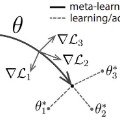An effective online recommendation system should jointly capture users' long-term and short-term preferences in both users' internal behaviors (from the target recommendation task) and external behaviors (from other tasks). However, it is extremely challenging to conduct fast adaptations to real-time new trends while making full use of all historical behaviors in large-scale systems, due to the real-world limitations in real-time training efficiency and external behavior acquisition. To address these practical challenges, we propose a novel Long Short-Term Temporal Meta-learning framework (LSTTM) for online recommendation. It arranges user multi-source behaviors in a global long-term graph and an internal short-term graph, and conducts different GAT-based aggregators and training strategies to learn user short-term and long-term preferences separately. To timely capture users' real-time interests, we propose a temporal meta-learning method based on MAML under an asynchronous optimization strategy for fast adaptation, which regards recommendations at different time periods as different tasks. In experiments, LSTTM achieves significant improvements on both offline and online evaluations. It has been deployed on a widely-used online recommendation system named WeChat Top Stories, affecting millions of users.
翻译:有效的在线建议系统应共同捕捉用户内部行为(来自目标建议任务)和外部行为(来自其他任务)的长期和短期偏好。然而,由于实时培训效率和外部行为获取方面的现实世界局限性,有效在线建议系统应共同捕捉用户的长期和短期偏好,因为用户的内部行为(来自目标建议任务)和外部行为(来自其他任务),对实时新趋势进行快速调整,同时充分利用大规模系统中的所有历史行为,同时充分利用大规模系统中的所有历史行为,这是极具挑战性的。为了应对这些实际挑战,我们提议了一个全新的长期短期短期短期模拟学习框架(LSTTM),供在线建议使用。它在全球长期图表和内部短期图表中安排用户的多源行为,并采用不同的基于GAT的聚合器和培训战略,分别学习用户的短期和长期偏好。为了及时抓住用户的实时利益,我们提议根据快速适应的同步优化战略,在快速适应方面采用一个时间式的元学习方法,其中涉及不同时期的建议。在实验中,LSTTM在离线和在线评价方面都作了重大改进,并在一个广泛使用的在线建议系统上对数百万用户产生影响。





